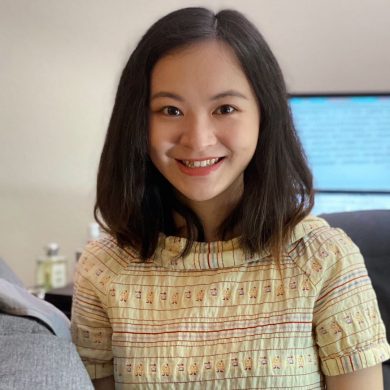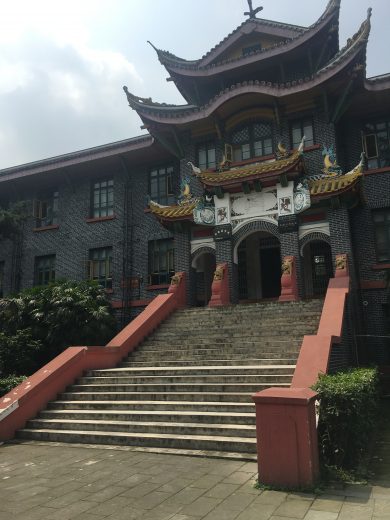Graduate Profile: Jinghong Zhang, History Doctoral Student

Jinghong Zhang is a PhD Student in the History Department at UC Santa Cruz whose current project focuses on the history of dentistry in twentieth-century China. Zhang is a scholar of modern Chinese social and cultural history, the history of medicine and public health in China, and gender.
In November, we spoke with Zhang about her research and experience as a THI fellow. We discussed emerging lines of inquiry in the medical humanities, the archival work which she completed last year, and the fascinating relationship between science and the project of modernization in China.
Thanks for speaking with us Jinghong! Before we go further, would you mind just telling us in broad strokes about your research? What are your interests and how would you describe your work?
What I hope to achieve through my dissertation project is to demonstrate the nexus between medical science, politics, modernity, and people’s everyday life by focusing on the historical development of dentistry in China, as well as analyzing the shifting cultural and political meanings that are attached to teeth.
My research interests broadly include the social, cultural, and gender history of modern China. My own academic work focuses on the history of medicine and public health in modern China. Specifically, I am interested in the ways in which medical history is intertwined with state-building, modernization, everyday life, and consumer culture in China’s long twentieth century.
Last summer you participated in the SSRC Dissertation Development Program hosted by THI. What was this process like for you? How did it benefit you as a scholar?
It was a great experience to participate in the UCSC SSRC Dissertation Development Program last summer. The five on-campus workshops offered me a valuable chance to share and discuss my own work with graduate students and faculty members from other disciplines, which helped me gain insights from non-historians and come to realize the usefulness of interdisciplinary approaches.
The SSRC-DPD grant enabled me to do three months of research in southwest China last summer. Back then, my dissertation topic was still concerned with the history of social welfare, philanthropy, and religion in twentieth-century China, a topic that I had worked on for more than two years. While there, I consulted the local archives and libraries, talked to some descendants of the alumni of a local missionary university, and visited some local book fairs. My experience at the local archives was quite frustrating; the materials I was able to access were quite fragmented because religion is one of the most censored topics in the Chinese archival system. But it was also these limited materials I collected in China that made me see the potential of a different topic and ultimately determine to pivot my research.

Your current project is a history of the development and institutionalization of dentistry in 20th-century China. You’re examining this in relation to issues in Western-Chinese medicine, public health, and everyday consumer culture. Can you tell us a bit more about this project? How do you view its historical, political, and cultural significance?
This project examines the historical development of dentistry in twentieth-century China by tracing the institutionalization of dental science and dental education, state promotion of dental hygiene under both the Nationalist and Communist governments, and the commercialization of everyday dental supplies. It will be the first historical study of dentistry and dental hygiene in modern China, a topic that is crucial to understanding the intersection of science, state-building, and society in China’s modernization.
What I hope to achieve through my dissertation project is to demonstrate the nexus between medical science, politics, modernity, and people’s everyday life by focusing on the historical development of dentistry in China, as well as analyzing the shifting cultural and political meanings that are attached to teeth. For instance, what can we know about state governance by investigating the state-led dental hygienic movements in China? What was the effect of dental science on Chinese people’s perception of their teeth, mouths, and bodies? How did the commercialization of dental hygiene supplies shape people’s everyday consumption and bodily practices? I think these questions are meaningful for deepening our understanding of China’s long and turbulent twentieth century as well as for complementing the global narrative of history of medicine.
I think the global pandemic of COVID-19 this year has demonstrated the importance of understanding the working mechanisms of the public health system, how global politics shapes it, and how closely connected it is to our daily life.
You’re bringing together so many interesting elements in this project. How does your work depart from the historiographical field as it stands? What new types of insights do you hope to bring to the field?
Historical studies of medicine in China have investigated how the modern form of medicine – Western medicine or biomedicine– confronted traditional Chinese medicine, and how the latter had to reform or modernize itself in order to survive. The practice and education of dentistry, however, have been separated from that of medicine. It thus does not fit neatly in the current scholarship and requires a thorough examination of its position in the historical trajectory of medicine. Asking how dentistry became institutionalized and professionalized in modern China and to what extent its development diverged from that of Western medicine in China, my dissertation will offer a new layer of complexity to studies of the Western-China medical encounter.
This year, conducting historical work has been profoundly shaped by events throughout the world – and perhaps most profoundly by the global pandemic. How has this shaped how you view your current work?
I think the global pandemic of COVID-19 this year has demonstrated the importance of understanding the working mechanisms of the public health system, how global politics shapes it, and how closely connected it is to our daily life. To some extent, this pandemic has validated that continuing to understand the history of medicine and public health is timely, relevant, and meaningful.
